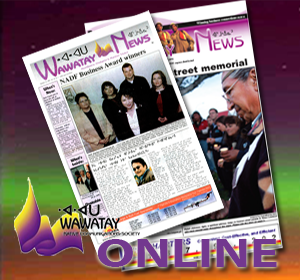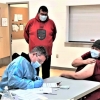Deputy Grand Chief Walter Naveau, pictured at a 2019 Nishnawbe Aski Nation event, spoke about the importance of continuing the COVID-19 public health measures during his Wawatay Radio Network update. Photo by Rick Garrick.
Deputy Grand Chief Walter Naveau stressed the importance of working with Wawatay Communications Society to get messages out about COVID-19 during his WRN (Wawatay Radio Network) update.
“That is why having Wawatay is important to air what’s going on pertaining to COVID-19 … because not all people have cellphones but they still talk amongst one another about the measures being taken,” Naveau says. “So that is why I find that Wawatay is very instrumental and very important in terms of getting the word out.”
Naveau says the COVID-19 vaccine uptake in the Nishnawbe Aski Nation (NAN) remote communities has been encouraging.
“This week Sandy Lake First Nation and Pikangikum First Nation will receive the first doses and more communities will begin their second round of vaccine clinics,” Naveau says. “I would like to add onto that our Grand Chief (Alvin Fiddler) as of yesterday got his first dose. I think that is very important — we have our representatives out there and we don’t want them to get ill. I commend him for taking that mushkiki (medicine).”
Naveau says people must remain vigilant with public health matters as well as avoiding non-essential travel whether they have received their COVID-19 vaccination or are waiting to receive it.
“Please remember to wear a face mask and do not go out unless it is essential,” Naveau says. “It is important that community (citizens) remain vigilant especially due to the (COVID-19) variants. We must continue to follow public health measures including wearing masks that fit well and provide a high degree of filtration. If possible wear closely knitted three-layer masks — the three layers should include two layers of tightly woven fabric with a filter layer between them.”
Naveau says wearing a disposable mask under a reusable mask will offer an additional layer of protection.
“Now is not the time to loosen up public health measures,” Naveau says. “Viruses can mutate as they reproduce — it is expected that variants of the virus that causes COVID-19 would reappear.”
Naveau says NAN has been hearing reports of cases of the three COVID-19 variants, B.1.1.7, B.1.351 and P.1, being identified in Ontario.
“The different variants are more transmissible and spread easier to others,” Naveau says. “It is important to recognize a few key points — we do not have all the answers about the variants yet. It is so important to take this seriously and be careful. Everything we are doing to protect ourselves against COVID-19 will work against the variants as well, this includes masking, physical distancing and hand hygiene.”
Naveau says vaccines are likely to be effective on the B.1.1.7 variant but may be less effective on the other variants.
“However the Moderna vaccine still works and provides some protection against the variants,” Naveau says, noting that the Pfizer vaccine also prevents people from getting ill from the variants. “In the future there will be other vaccines or booster shots for these variants.”
Naveau says information about the Moderna vaccine and distribution plans for the NAN communities is being translated into Cree, Anishinabemowin and Anishininimowin.
“It is important that everyone in our communities understand this material,” Naveau says.
Naveau says vaccination is the most effective way to prevent the spread and reduce the impact of COVID-19.
“It is important to remember that only vaccines that are effective and safe are approved by Health Canada,” Naveau says. “Vaccines can help keep NAN (citizens) and communities safe. The Moderna vaccine does not cause coronavirus infections — it helps to build up our body’s ability to fight off the virus.”
The WRN updates are posted at: nancovid19.ca/?cat=62.













One of the most beautiful serene places I’ve ever visited was on the banks of the Opinagau River in northern Ontario, just near the corner of land where...
This wave of cold weather reminds me that I do not have a lot of motorcycle riding time left and that summer will soon be turning into fall. Students are...